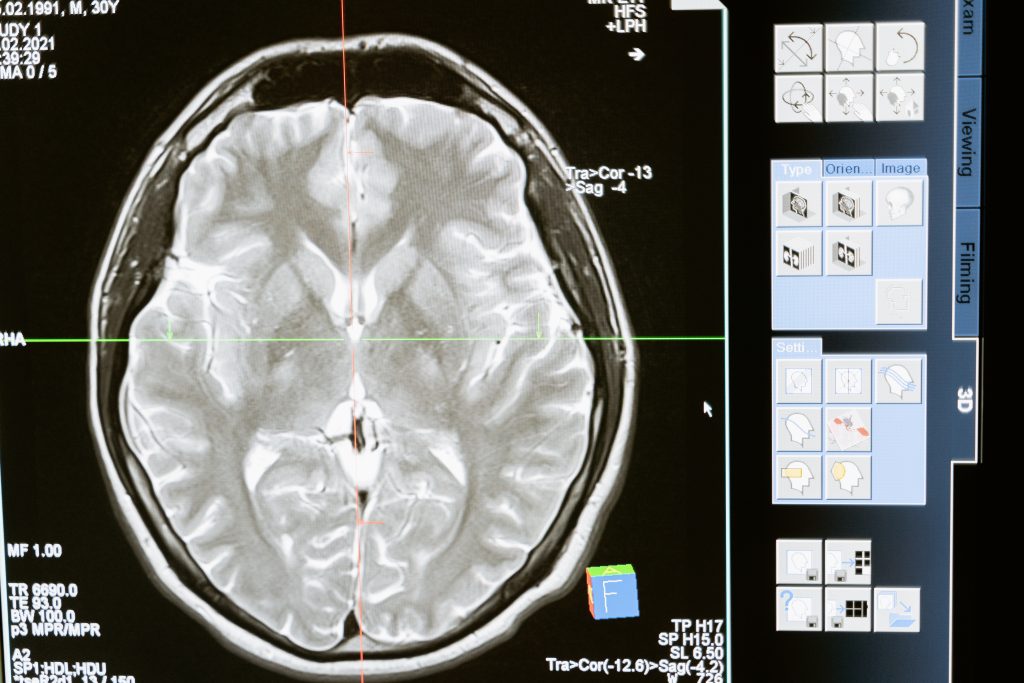*Disclaimer: The information on the Anthony Gold website is for general information only and reflects the position at the date of publication. It does not constitute legal advice and should not be treated as such. It is provided without any representations or warranties, express or implied.*
The Effects of Mild Traumatic Brain Injury and How to Claim Compensation

Anthony Gold’s Injury & Medical Claims department specialises in dealing with claimants who have sustained a brain injury following an accident or negligent treatment.
In this article, one of our resident legal experts, Amanda Hopkins, will describe what is meant by a ‘mild traumatic brain injury’ and what the lasting effects can be to an individual who has suffered one. We also discuss how you can seek compensation if your life, or the life of a loved one, has been impacted by a mild to moderate traumatic brain injury.

What is meant by a ‘mild’ brain injury?
Recent media reports into the brain injury sustained by British athlete James Cracknell have sparked discussions about what is meant by the term “brain injury”. A layperson will most likely imagine a scenario whereby the injured party is unable to function independently and suffers from consequential physical disabilities rendering them bed/wheelchair bound and possibly requiring care within an institutional environment.
The reality is that there is a spectrum of injuries ranging from a coma to concussion, and every shade in between. When it comes to brain injuries, ‘mild’ may seem an odd choice of word when we are talking about symptoms which will impact a client for the rest of their life. Mild can, and often does, equal devastating. Although an individual may not require round-the-clock care, as can be the case with severe brain injuries, they may find their life has changed in a number of other, irreversible ways.
Mild brain injuries can result in a number of short and long-term effects, which include but are not limited to:
- Memory loss;
- Impaired cognitive processing (being unable to process or comprehend information as quickly or efficiently as before);
- Reduction or loss of senses (hearing loss, vision loss, loss of taste, touch, or smell);
- Loss of inhibition, leading to risky or impulsive behaviour;
- A sudden and marked change in personality.
This final side effect, though not guaranteed, is the one which is often the hardest on both the individual who suffered the mild traumatic brain injury and their loved ones. A person may feel that their lives, and even their personality, have been altered by this single event, and may find themselves feeling frustrated, frightened, and extremely distressed by their new situation.

Psychiatric effects of a mild traumatic brain injury
In my experience of acting for claimants, psychiatric injury often goes hand in hand with sustaining a mild traumatic brain injury. This may be a delayed reaction, as for a period, the individual will be concentrating on their immediate physical recovery from an accident (fractures healing, follow-up appointments, physiotherapy etc).
A brain-injured client may also be in denial that there is anything wrong with their brain function and, even if they acknowledge that there is a problem, they convince themselves that they will eventually belong to the majority who will go on to recover from any cognitive deficit. However, psychiatric disorders such as anxiety, depression, and Post-traumatic Stress Disorder (PTSD) have all been commonly observed in those who have suffered a traumatic brain injury – even if it was comparatively mild.
Whilst the majority of people that suffer a mild traumatic brain injury will go on to recover, there are some whose lives have been so severely impacted in the short-term, or who find themselves suffering long-term effects. In instances like these, it may be beneficial for the person to seek compensation if the injury was caused through no fault of their own.
Who can claim compensation for a mild traumatic brain injury?
At Anthony Gold, we encourage clients to consider seeking compensation in instances where their lives or finances have been negatively impacted by an injury which was not their fault. In the event of a mild traumatic brain injury, an individual could face a number of negative consequences which are not their fault. Commonly, we would seek compensation to cover loss of earnings, medical expenses, emotional distress, and any other financial, physical or emotional burden that the client has suffered.
Take, for example, a professional project manager who is no longer able to process information as quickly as before. Coping mechanisms can be learnt such as detailed note-taking, dictating instructions to oneself, taking photographs as visual aids and employing assistants to delegate tasks.

This all has financial implications when it’s understood that projects take longer to complete, fewer projects can be undertaken and extra staff eat into profit costs. Reduced earning capacity will be a maintaining factor for the psychiatric reaction to the brain injury.
Depression, anxiety, and adjustment disorders (all well-known psychiatric injuries following brain injury) can in turn have an impact on an individual’s ability to learn coping strategies. It is an ever-increasing, vicious cycle. As solicitors, it is our job to ensure that any future losses are thoroughly considered and investigated, so the claimant is appropriately compensated. However, this can be a tricky task if your client is in denial about the existence and/or the severity of their injury.
Mild Traumatic Brain Injury: Case Study
The media reports I refer to in my opening paragraph concern the marriage break-up of James Cracknell and Beverley Turner, announced in March 2019. There are numerous reports so I will not link to a specific one. Those familiar with James’ story will know he sustained a brain injury in 2010 leading to (amongst other things) a distinct change in personality. At the time of the accident, the couple were told by treating doctors that 75% of marriages where one partner suffers a brain injury fail. They were determined not to be one of that majority.
Over the intervening years, the media has reported James’ recovery, his return to sports, the challenges he has set himself and, most recently, his return to study and participation in the Boat Race. For the media this may have been a “shock split”, but for those familiar with brain injury the outcome is a sad and familiar one.
When working with brain-injured clients and considering their cases from a medico-legal point of view, it is easy to overlook the fact that when someone sustains a brain injury it affects the whole family, and beyond. The injured and those around them have a relentless daily struggle. Years down the line when the shock, sympathy, and support offered in the immediate aftermath have depleted, those living with brain injury are still doing just that, living with brain injury.
James’ story – or I should say more correctly his family’s story – demonstrates that sustaining a brain injury does not mean it has to be life-limiting. His brain injury does not define him. But it also does not mean that life will be all good after a certain recovery period has passed. There are some injuries for which time is not a complete healer. In cases like these, seeking compensation can help to repair the damage done by the injury and secure a better life for the individual brain injury sufferer and their family.
How can I claim compensation for a mild traumatic brain injury?
If you or somebody that you care about has suffered a mild traumatic brain injury and is suffering any of the short or long-term effects we’ve discussed within this article, you may like to get in touch with our expert Injury & Medical claims team. You can submit an enquiry via the form on our homepage, and a member of the team will be in contact shortly to discuss your case.
Find out more about the type of bespoke brain injury legal services we offer to clients, or visit one of our accompanying brain injury articles below to discover what else we can do to help.
- Traumatic brain injury and its long-term effects
- What is a trial of independent living, and why are they so important?
- The dangers of early settlement in child brain injury claims
Please note
The information on the Anthony Gold website is for general information only and reflects the position at the date of publication. It does not constitute legal advice and should not be treated as such. It is provided without any representations or warranties, expressed or implied.

Related Insights
- April 5, 2019
Dishonesty in personal injury claims
- November 21, 2018
YAH v Medway: psychiatric injury claim by the mother of an injured baby
- October 1, 2018
Vicarious liability: Barclays Bank v Various Claimants
Our Latest Injury & Medical Claims Insights
- October 6, 2025
Jess’s Rule – a welcome reminder to reconsider persistent symptoms
- September 26, 2025
Intermediate track injury claims: the rise of early settlement offers
- August 26, 2025
Anthony Gold Solicitors welcome Helen Whittam as a new Support and Rehabilitation Coordinator in the Injury and Medical Claims Team
- August 19, 2025
Contributory negligence and children
- August 13, 2025
Video: From tragedy to triumph – Eliezer’s journey after a life-changing accident
- July 9, 2025
What is Contributory Negligence and How Could it Affect Your Claim?
Latest Articles
View allGuide: November 7, 2025
Guide: November 7, 2025
Guide: November 6, 2025
Contact the Conveyancing team today
Contact us today
"*" indicates required fields
Contact the commercial
& civil Dispute team today
"*" indicates required fields
Contact the Conveyancing team today
Contact the Conveyancing team today
Contact the Wills, Trusts
& Estates team today
Contact the Court of
Protection team today
Contact the Employment Law team today
Contact the Clinical Negligence team today
Contact the Family & Relationships team today
Contact the Personal Injury Claims team today
Contact the leasehold & Freehold team today
Contact the Corporate & Commercial team today
Contact the housing & disputes team
"*" indicates required fields














